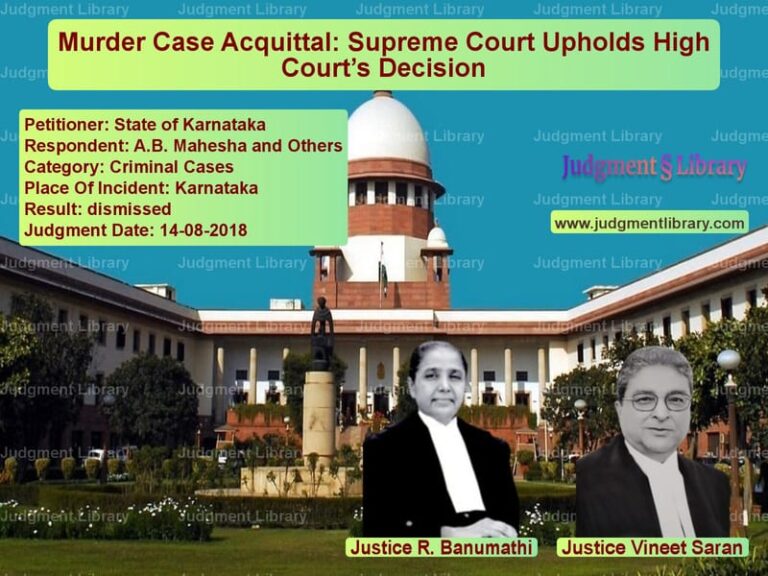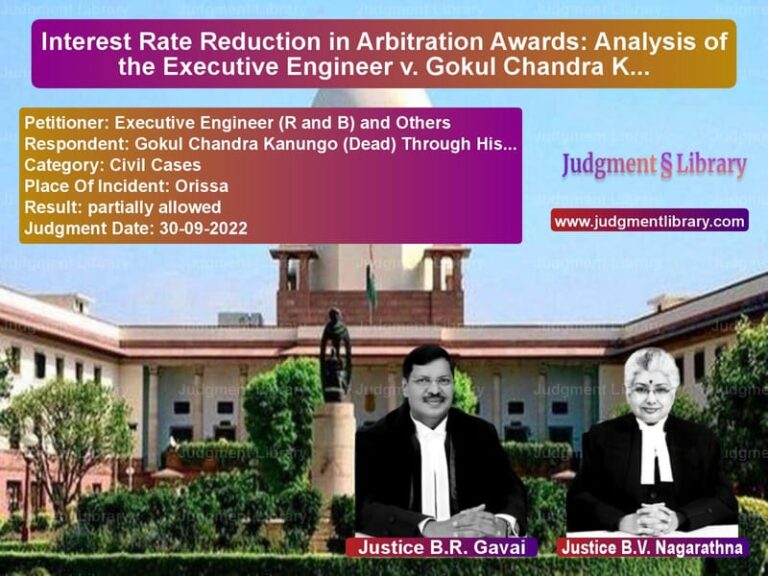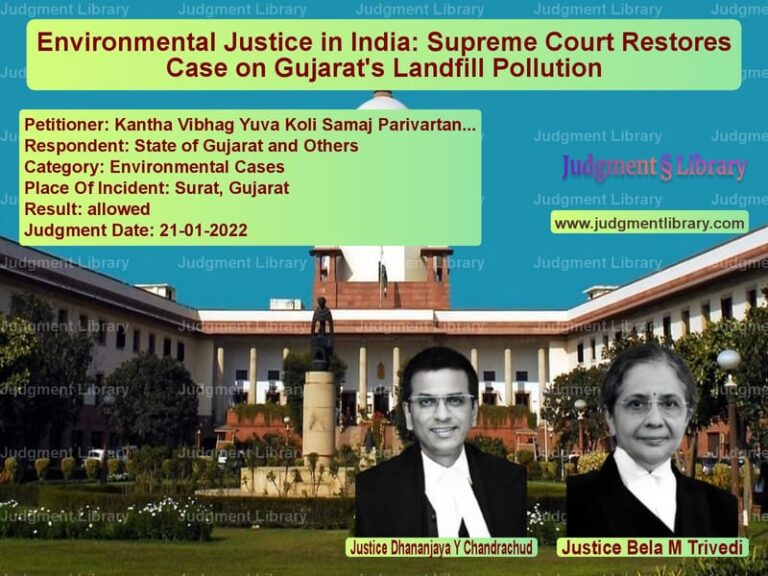Supreme Court Reduces Sentence in POCSO Case, Citing Rehabilitation and Family Impact
The Supreme Court of India recently ruled on a case involving the Protection of Children from Sexual Offences (POCSO) Act, reducing the sentence of the appellant, Rajasekar, who had been convicted under Section 3(a) read with Section 4 of the POCSO Act, 2012. While upholding the conviction, the Court considered the appellant’s family responsibilities and the well-being of the victim in modifying the sentence to time already served.
Background of the Case
The case dates back to the conviction of Rajasekar under the POCSO Act by the Sessions Court. He was sentenced to 10 years of rigorous imprisonment along with a fine of ₹5,000. Additionally, the State Government was directed to pay ₹1,00,000 in compensation to the victim under Rule 7(2) of the POCSO Rules, 2012.
Upon appeal, the Madras High Court upheld the conviction and sentence, affirming the Sessions Court’s findings. However, Rajasekar approached the Supreme Court, challenging only the quantum of the sentence and not the conviction itself.
Arguments by the Appellant
- The appellant had already served more than seven years of his sentence, which was the minimum prescribed sentence under Section 4 of the POCSO Act at the time of his conviction.
- He was financially supporting the victim and her child, and further imprisonment would adversely impact both his family and the victim’s well-being.
- Given the circumstances, the appellant sought leniency in the duration of his remaining sentence.
Arguments by the Respondent
- The prosecution maintained that the offense was of a serious nature and warranted strict punishment.
- They argued that the legislative intent behind the POCSO Act was to ensure stringent penalties to deter crimes against minors.
- The State emphasized that any reduction in sentence should not undermine the gravity of the offense.
Supreme Court’s Observations
The Supreme Court acknowledged the severity of offenses under the POCSO Act while also considering the circumstances presented by the appellant. The key observations included:
1. Sentencing Must Be Proportionate
The Court noted that while the offense under POCSO is serious, sentencing must take into account individual circumstances. The Court emphasized:
“Having heard the learned counsel for the parties and considering the totality of the circumstances of the case, we are of the view that the ends of justice would be met if the period of imprisonment awarded against the appellant is reduced to the period already undergone by him.”
2. Consideration of Family and Victim’s Well-Being
The Court took into account that the appellant was providing financial support to the victim and her child. It stated:
“It is also submitted that the appellant is providing for the day-to-day expenses of the victim and her child, and therefore, further imprisonment will impact not only his family but also the victim’s.”
3. Compliance with Minimum Sentencing Requirements
The Court observed that at the time of conviction, the minimum sentence under Section 4 of the POCSO Act was seven years, and the appellant had already served more than this period. This justified a reconsideration of his sentence.
4. Legal Precedents Supporting Sentence Reduction
The Court referred to past cases where sentences were modified based on the convict’s reformation and the impact on dependent family members. It emphasized that justice must balance retribution with rehabilitation.
Final Judgment
- The Supreme Court confirmed the appellant’s conviction under Section 3(a) read with Section 4 of the POCSO Act.
- The sentence was modified to the period already undergone by the appellant.
- The appellant was ordered to be released immediately if he was not required in any other case.
Legal and Social Implications
1. Balancing Punishment and Rehabilitation
The ruling underscores the importance of considering the rehabilitation of convicts, particularly in cases where the minimum sentence has been served.
2. Flexibility in Sentencing
This decision sets a precedent that courts can consider mitigating factors, such as the convict’s role in financially supporting victims, while determining appropriate sentencing.
3. Reinforcing Judicial Discretion
The judgment highlights the role of judicial discretion in tailoring sentences based on individual circumstances rather than adhering to rigid punishment frameworks.
Conclusion
The Supreme Court’s ruling in this case reinforces the principle that sentencing must serve both punitive and rehabilitative functions. By modifying the appellant’s sentence to time already served, the Court acknowledged his compliance with the minimum prescribed punishment and his efforts to support the victim. This judgment serves as a benchmark for future cases, ensuring a balanced approach in applying penal provisions under the POCSO Act.
Petitioner Name: Rajasekar.Respondent Name: State represented by Inspector of Police.Judgment By: Justice Vikram Nath, Justice Satish Chandra Sharma.Place Of Incident: Tamil Nadu.Judgment Date: 05-02-2024.
Don’t miss out on the full details! Download the complete judgment in PDF format below and gain valuable insights instantly!
Download Judgment: rajasekar-vs-state-represented-by-supreme-court-of-india-judgment-dated-05-02-2024.pdf
Directly Download Judgment: Directly download this Judgment
See all petitions in Juvenile Justice
See all petitions in Bail and Anticipatory Bail
See all petitions in Judgment by Vikram Nath
See all petitions in Judgment by Satish Chandra Sharma
See all petitions in partially allowed
See all petitions in Modified
See all petitions in supreme court of India judgments February 2024
See all petitions in 2024 judgments
See all posts in Criminal Cases Category
See all allowed petitions in Criminal Cases Category
See all Dismissed petitions in Criminal Cases Category
See all partially allowed petitions in Criminal Cases Category







